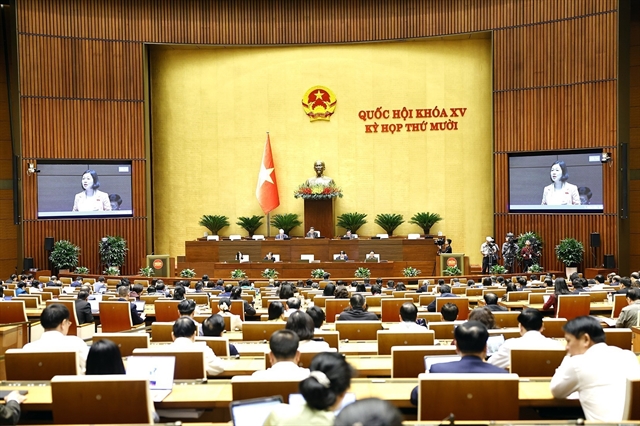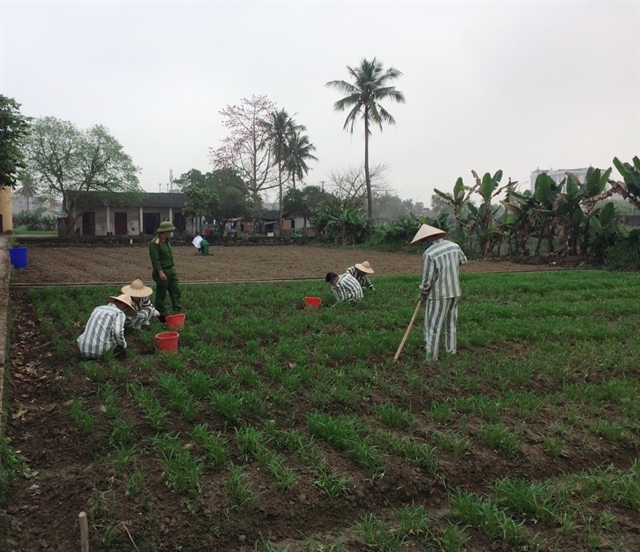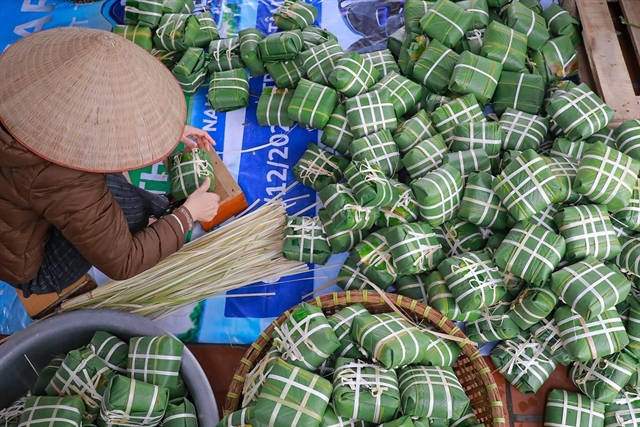 Politics & Law
Politics & Law


|
| The National Assembly debated the two draft laws on Wednesday. — VNA/VNS Photo |
HÀ NỘI — Việt Nam’s National Assembly (NA) on Wednesday debated a sweeping revision of the country’s criminal enforcement laws that could allow prisoners to donate organs and reproductive materials and take up paid work outside correctional facilities.
Draft amendments to the Law on Execution of Criminal Judgments and the new Law on Enforcement of Temporary Detention, Custody and Restriction from Leaving One’s Place of Residence were discussed in a plenary session chaired by NA Vice Chairman Nguyễn Khắc Định as part of the legislature’s 10th sitting.
The proposed changes would, for the first time, recognise an inmate’s right to donate tissues and body parts or store sperm and eggs under defined conditions.
They would also formalise a three-year pilot scheme permitting certain prisoners to work with external employers to aid rehabilitation and social reintegration.
Lawmakers said the revisions reflect an effort to make Việt Nam’s criminal justice system more aligned with principles of rehabilitation and respect for human dignity.
"Even for those serving prison sentences, their basic rights should be protected," said Tô Văn Tám, a NA delegate from Quảng Ngãi.
"The goal of criminal management is not only punishment, but education and reform."
NA delegate Trần Hoàng Ngân from HCM City said he supported the provision on organ and tissue donation, noting that Việt Nam’s demand for transplants far outstrips supply.
"This article could help raise awareness of donation," he said, while calling for family consent and clear eligibility rules.
Other delegates urged restraint, describing the proposals as sensitive and complex.
Delegate Nguyễn Thanh Sang of HCM City said the measure should be limited to donations to immediate family members and restricted to prisoners who act voluntarily, are in good health and have fewer than five years remaining on their sentence.
"We have not yet fully assessed the political, social and legal consequences," he said.
Đồng Tháp delegate Phạm Văn Hòa warned that organ donation "must never be for profit" and that any procedure should involve medical oversight to prevent complications.
He also questioned the practicality of letting inmates store reproductive material, citing the cost and technical demands.
"This requires advanced medical processes and long-term monitoring," he said.
NA delegate Huỳnh Thanh Phương of Tây Ninh added that the issue should not be written into law until its implications are carefully reviewed.
"If the aim is to ensure human rights, that is positive, but implementation must be realistic," he said.
Responding to lawmakers, Minister of Public Security General Lương Tam Quang said the drafting committee would coordinate with the NA’s verifying body to refine the legislation.
He said the law would require that organ or tissue donations be entirely voluntary, that donors be medically fit to continue serving their sentences and that prisoners cover all related expenses themselves.
Eligibility would be confined to first-time offenders with fewer than three years remaining on their term, and donations could be made only to family members, the minister said.
On the proposal to allow prisoners to store sperm or eggs, he described the intent as "humanitarian in nature", but said further study is needed to determine whether detention facilities could safely and feasibly support such procedures.
Lawmakers also discussed expanding opportunities for prisoners to engage in labour both inside and outside prison walls. Supporters said the move could build work skills, improve morale and make re-entry into society smoother after release.
"The participation of the community and businesses in sentence enforcement has proved effective," said Tô Văn Tám, noting that the pilot programme authorised by NA Resolution 54 has shown positive results over the past three years.

|
| Inmates at a prison in the northern province of Thanh Hóa work in the vegetable garden under staff supervision. — Photo conganthanhhoa.gov.vn |
Hòa and other delegates suggested allowing inmates to send part of their earnings home to support families facing financial hardship.
"If their income is legitimate, they should be able to help their families," Hòa said.
Several speakers nevertheless cautioned that work programmes must prioritise security and safety. They urged the Government to issue detailed regulations on supervision, procedures and occupational conditions.
The companion Law on Temporary Detention, Custody and Restriction from Leaving One’s Place of Residence would clarify detainees’ rights to meet relatives, receive medical treatment and access books and newspapers.
Some delegates said the draft is too vague about the responsibilities of local authorities and called for clearer coordination between the commune-level police and People’s Committees to avoid overlapping duties.
Others proposed authorising temporary detention rooms at Border Guard posts to meet operational needs and reduce procedural violations.
Minister Lương Tam Quang said his ministry would review those provisions and make adjustments "to meet practical requirements."
While the proposals on organ donation and prison labour drew the most public attention, delegates broadly agreed that the revisions mark a shift toward a more humane, regulated approach to criminal justice. — VNS




